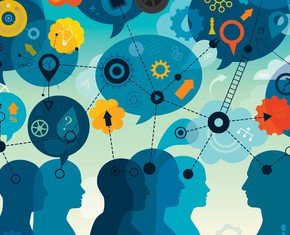The views expressed in our content reflect individual perspectives and do not represent the authoritative views of the Baha'i Faith.
In today’s world, mass migration has become a major factor in the slow dissolution of the concept of hard national borders—and the disintegration of the idea of race, too.
Think about it: where do you come from? Did your ancestors always live where you live now?
Globally, 99.99% of the world’s people have now migrated away from their “original” ancestral homeland. So unless you live in the Horn of Africa near the Great Rift Valley, where human life as we know it began, your family migrated at some point.
We are all migrants. Why? Because our ancestors repeatedly moved from one place to another, and then another, and then another. The history of humanity tells the story of continual migration—because we’ve always looked for food, for shelter, for work and for a safe place to raise our children. Migration describes the normal human condition, not an exception to the rule—we all descended from nomadic tribal people at some point in our ancestry.
Just about everyone who has had their DNA analyzed knows this reality, because all living people on Earth today have a diverse biological heritage that includes many different geographic and ethnic strains. In fact, scientific consensus has now concluded that “race” is a social construct, not a biological one. Instead, scientists now use the word “ancestry” rather than “race,” primarily to recognize the multiple geographical and ethnic origins of our ancestors.
So in a sense, we’re all migrants, with the possible exception of a few thousand Africans in modern-day Djibouti, Eritrea, Somalia and Ethiopia. Which means, according to the Baha’i teachings, that we have all become equal citizens of one indivisible world:
That one indeed is a man who, today, dedicateth himself to the service of the entire human race. The Great Being saith: Blessed and happy is he that ariseth to promote the best interests of the peoples and kindreds of the earth. In another passage He hath proclaimed: It is not for him to pride himself who loveth his own country, but rather for him who loveth the whole world. The earth is but one country, and mankind its citizens. – Baha’u’llah, Tablets of Baha’u’llah, p. 167.
That remarkable, revolutionary concept of transnational, global citizenship is the core social principle of the Baha’i Faith.
The idea of world citizenship has implications for the entire political structure of the planet’s governments and societies. Challenging old, outworn notions about nationality, citizenship, patriotism and love of country, it calls for the complete remaking of the prevailing nationalist order, asking every human being to reconsider their “national” identity, subordinate their love of country and replace it with a wider and more inclusive love and loyalty for all humanity—and for the Earth itself:
May you all be united, may you be agreed, may you serve the solidarity of mankind. May you be well-wishers of all humanity. May you be assistants of every poor one. May you be nurses for the sick. May you be sources of comfort to the broken in heart. May you be a refuge for the wanderer. May you be a source of courage to the affrighted one. Thus, through the favor and assistance of God may the standard of the happiness of humanity be held aloft in the center of the world and the ensign of universal agreement be unfurled. – Abdu’l-Baha, The Promulgation of Universal Peace, p. 425.
Baha’is believe that, once adopted and put into practice, world unity and global citizenship will end the terrible injustices of birth and the tyranny of national borders; will not only allow but encourage the free movement of all people across the planet; will help halt the humanitarian crises and disasters now foisted upon us by the governments of corrupt, competing and combative countries; will offer humanity its first true opportunity to effectively address the entire Earth’s pressing environmental issues; will increasingly bring the populations of all regions into peaceful contact with each other; and most importantly, will make it impossible for any one nation to impose its will on others by unilaterally declaring and waging war.
All of this, Baha’is believe, comes from the new Baha’i revelation brought by Baha’u’llah—who was himself a refugee and a prisoner of conscience:
Through the power of Baha’u’llah all will be united. He upraised this standard of the oneness of humanity in prison. When subjected to banishment by two kings, while a refugee from enemies of all nations and during the days of His long imprisonment He wrote to the kings and rulers of the world in words of wonderful eloquence, arraigning them severely and summoning them to the divine standard of unity and justice. He exhorted them to peace and international agreement, making it incumbent upon them to establish a board of international arbitration—that from all nations and governments of the world there should be delegates selected for a congress of nations which should constitute a universal arbitral court of justice to settle international disputes. – Abdu’l-Baha, The Promulgation of Universal Peace, pp. 202-203.
That universal arbitral court of justice, and the world unity and global citizenship it serves, will also make the lives of refugees and migrants who need to cross borders simpler and safer.
In the next essay in this series, we’ll examine the lives of the founders of the world’s great Faiths, and try to understand their experiences as outcasts, refugees and migrants.
















Comments
Sign in or create an account
Continue with Googleor